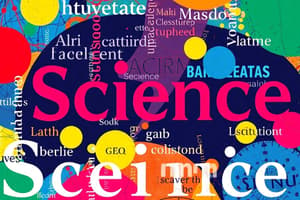Podcast
Questions and Answers
What is the translation of the term phagocytosis?
What is the translation of the term phagocytosis?
- to eat a cell in normal condition
- to destroy a cell in normal condition
- to eat a cell in abnormal condition (correct)
- to protect a cell in abnormal condition
What type of learner prefers learning by listening to lectures?
What type of learner prefers learning by listening to lectures?
- Hands-on learner
- Visual learner
- Holistic learner
- Auditory or Verbal learner (correct)
What is the preferred method of learning for a hands-on learner?
What is the preferred method of learning for a hands-on learner?
- Reading textbooks
- Watching videos
- Performing laboratory experiments (correct)
- Discussing new information out loud
What is the primary focus of holistic learning?
What is the primary focus of holistic learning?
What is the largest group in the taxonomy of living things?
What is the largest group in the taxonomy of living things?
What type of learner benefits from looking at pictures or charts?
What type of learner benefits from looking at pictures or charts?
What is the main characteristic of analytical learning?
What is the main characteristic of analytical learning?
What is required for a person to learn about cellular respiration?
What is required for a person to learn about cellular respiration?
What is the primary advantage of hands-on learning?
What is the primary advantage of hands-on learning?
What is the definition of phagocytosis?
What is the definition of phagocytosis?
Flashcards are hidden until you start studying
Study Notes
Science Terminology Challenges
- Science vocabulary becomes increasingly difficult to understand and pronounce, especially as one studies scientific topics in greater detail.
- This is because many scientific terms are rooted in different languages, such as Greek and Latin, which are used universally in science.
Greek and Latin in Science
- Greek and Latin words are used in science terminology because many pioneering scientists and researchers were Greek, and Latin was an international language at the time of scientific discovery.
- Examples of Greek and Latin in science vocabulary include apoptosis, biology, and centrifugal.
Dissecting Science Vocabulary
- Many scientific terms are formed by using different word parts, such as roots, prefixes, and suffixes, which are typical of Greek or Latin origin.
- The word "apoptosis" can be dissected to understand its meaning, with the prefix "apo-" translating to "separating" and the root "-ptosis" translating to "falling off".
- The term "biology" means the study of life or living organisms, with the root word "bios" meaning "life" and the suffix "-ology" meaning "the study of".
- The term "hydrocephalus" means a medical condition where fluid is found in the brain, with the prefix "hydro-" referring to water and the suffix "-cephalus" referring to the head.
Common Science Terms
- Centrifugal means the tendency to move away from the center of an object or entity.
- Photosynthesis is the process by which plants use sunlight and water to produce their own nutrients.
- Hydrogenation is the addition of hydrogen in a chemical reaction.
- Ornithology is the study of birds.
- Hypothesis is an educated explanation for a certain phenomenon.
- Ecology is the study of the ecosystem or environment.
- Heterotroph is an organism that relies on external sources of nutrients.
- Autotroph is an organism that makes its own nutrients via chemical processes.
Morphemes of Common Science Terms
- Morphemes are parts of words that are broken down and cannot be broken down further.
- The term "centrifugal" is rooted in Latin origin and comes from the term centrum, which means "center".
- The suffix "-fugal" comes from "fugere" which means "to flee".
- The term "biology" is a combination of the root word "bios" and the suffix "-ology", which means "the study of".
Word Parts
- There are three main word parts: roots, prefixes, and suffixes.
- Roots are the base words for new words.
- Prefixes are found at the beginning of a word and change its meaning.
- Suffixes are found at the end of a word and also change its meaning.
Science: Root, Prefixes, and Suffixes
- The term "phagocytosis" consists of all word parts, including the prefix, root, and suffix, and is Greek in origin.
- The root word "-cyt-" refers to a cell and the prefix "phago-" translates to "to eat".
- The suffix "-osis" refers to an abnormal condition.
Unique Study Styles
- There are three primary unique study styles: auditory or verbal, visual, and hands-on.
- Auditory or verbal learners learn best via hearing new information.
- Visual learners need to see something to help with understanding new concepts.
- Hands-on learners need to learn by performing a task themselves or physically touching an object.
- Some individuals learn best using a combination of these study styles.
Approaches to Learning
- Approaches to learning and studying can be holistic or analytical.
- Holistic learning tends to group new concepts or ideas with those that have already been learned.
- Analytical learning divides concepts or material into small subsections.
Studying That Suits You
Use AI to generate personalized quizzes and flashcards to suit your learning preferences.




